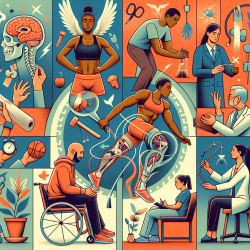Unlocking Potential: Embracing Psychological Responses in ACL Rehabilitation
Helping athletes return to sports participation is a primary goal of anterior cruciate ligament (ACL) reconstruction rehabilitation. However, a significant number of athletes do not return to their pre-injury level of sports participation due to psychological barriers. Recent research highlights the importance of addressing psychological responses, such as fear of re-injury, kinesiophobia, and self-efficacy, in the rehabilitation process.
Studies have shown that psychological responses can significantly impact clinical outcomes, making them an essential consideration in ACL rehabilitation. The Integrated Model of Response to Sports Injury illustrates the connection between psychological responses and clinical outcomes, emphasizing the need for a holistic approach to rehabilitation.
Implementing Psychological Informed Practice (PIP)
One promising approach to integrating psychological responses into rehabilitation is the Psychological Informed Practice (PIP) model, initially developed for low back pain management. PIP involves administering psychological questionnaires to screen for factors that may negatively impact clinical outcomes and incorporating psychologically based interventions alongside traditional physical therapy.
- Screening: Use psychological questionnaires, such as the Anterior Cruciate Ligament Return to Sport after Injury tool, to assess psychological responses.
- Interventions: Implement cognitive-behavioral techniques and patient-centered communication to address psychological barriers.
- Monitoring: Continuously assess psychological responses throughout rehabilitation to tailor interventions effectively.
Adopting the PIP approach in ACL rehabilitation can improve patient adherence and outcomes by addressing the psychological aspects of recovery. It also provides an opportunity for sports physical therapists and athletic trainers to expand their skillset in patient-centered communication and psychologically based interventions.
Overcoming Challenges in Implementation
While the PIP approach offers numerous benefits, its implementation in routine practice can be challenging. Clinicians may need formal education and mentorship to gain competence and confidence in using this approach. Additionally, barriers such as negative beliefs, clinical culture, and lack of administrative support may hinder adoption.
To overcome these challenges, sports rehabilitation clinics can develop integrated services that include sports psychologists or establish referral pathways for athletes with extensive psychological needs. Collaboration between physical therapists and sports psychologists can enhance clinical care and improve patient outcomes.
Future Directions
The PIP approach is just one method for managing psychological responses in ACL rehabilitation. Future research should focus on identifying effective interventions and refining the PIP model for specific populations. Educators can also incorporate PIP concepts into entry-level curriculums and residency programs to prepare future clinicians for holistic rehabilitation practices.
To read the original research paper, please follow this link: Go to the back before going forward: Addressing psychological responses in anterior cruciate ligament reconstruction rehabilitation.










